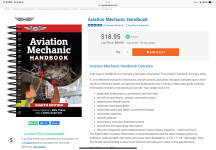Hello,
I have a 9A, a hangar, some tools, some ability. I never grew up working on cars (or airplanes) so it's not 2nd nature to me. I HAD a guy who was able to look after the entire annual process, but no longer. I need to come up with a plan for ongoing maintenance.
I've taken part in some annual inspection activities on my plane, but not enough to do the entire job. It would be great to take a proper course and spend some time, hands on, building skill and confidence. Any suggestions? I'm in Canada, but could travel into the US. Any thought on the 2 day light sport repairman inspection course (without the post course paperwork).
Thanks,
Mike
I have a 9A, a hangar, some tools, some ability. I never grew up working on cars (or airplanes) so it's not 2nd nature to me. I HAD a guy who was able to look after the entire annual process, but no longer. I need to come up with a plan for ongoing maintenance.
I've taken part in some annual inspection activities on my plane, but not enough to do the entire job. It would be great to take a proper course and spend some time, hands on, building skill and confidence. Any suggestions? I'm in Canada, but could travel into the US. Any thought on the 2 day light sport repairman inspection course (without the post course paperwork).
Thanks,
Mike





